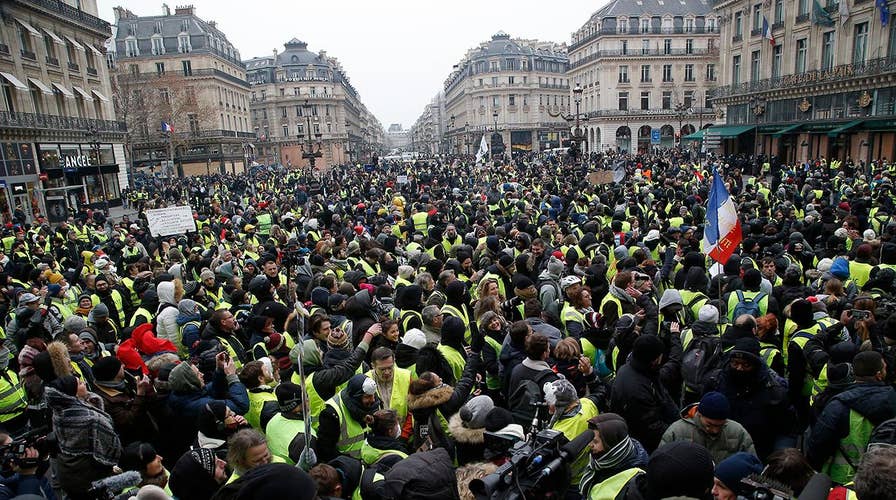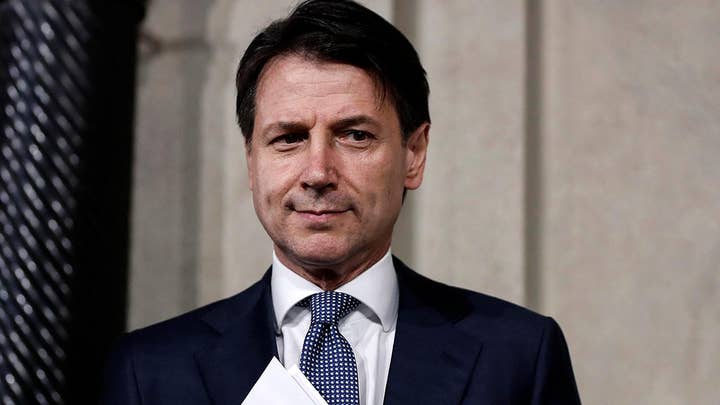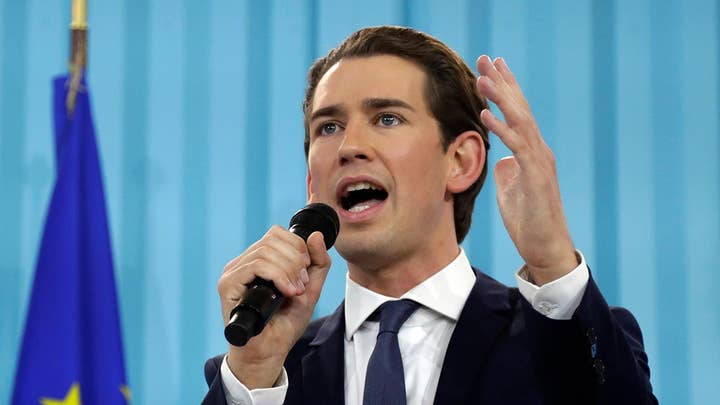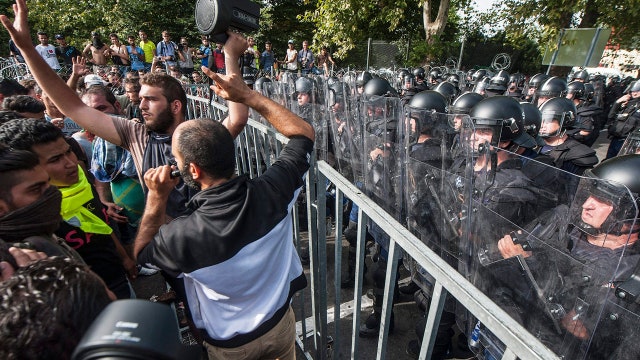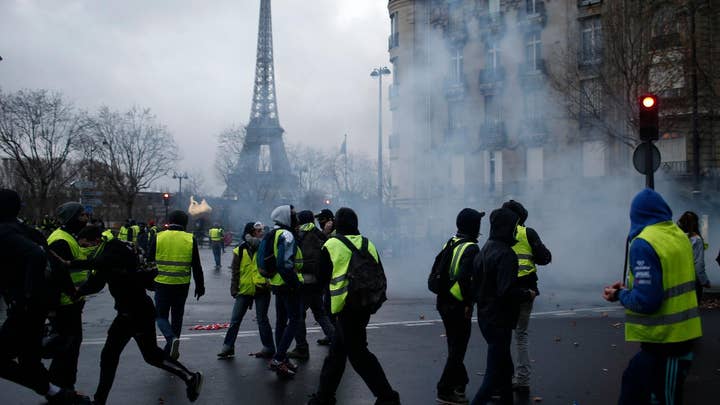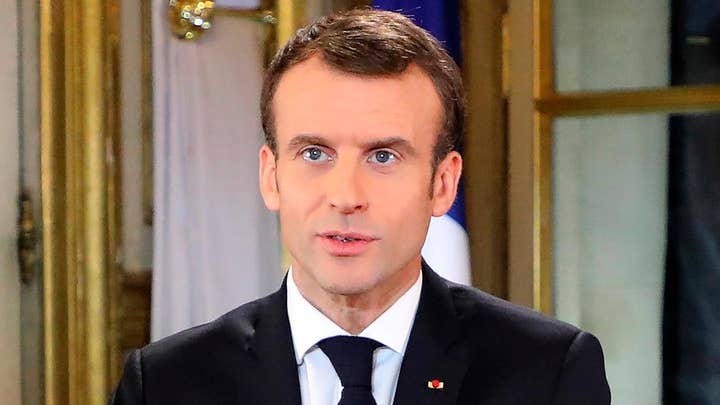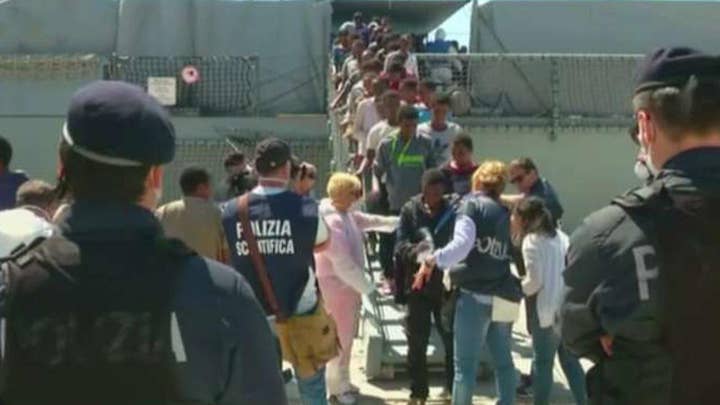Protests continue in France despite concessions from Macron
Demonstrators clash with police in Paris for the fifth straight weekend; Greg Palkot reports on the unrest.
2018 was the year populism went mainstream and beyond the United States and Britain – sweeping Europe with demands for a change in the status quo.
Beset by increasing social and economic problems, exacerbated by the influx of migrants from the Middle East and Africa, and the dysfunction of the European Union, the continent’s voters went to the voting booths or the streets, increasingly embracing populist ideas.
From Hungary and Austria to France and Italy, populist movements stunned European governments and establishment parties who long had an unchallenged grip on power.
Italy
Earlier this summer, anti-establishment populist parties took control of the Italian government, promising a government of change with an ambitious economic program.
The Five Star Movement, headed by Luigi Di Maio, won the election after receiving nearly a third of the votes. It entered into a coalition with the populist right-wing League party, led by Matteo Salvini, which won 18 percent of the vote – a stark jump from four percent of the vote just five years ago.
Both parties came into power as a backlash to the European Union’s push for austerity measures in the country at a dire social cost and the migrant crisis that particularly hit Southern Italy, with hundreds of thousands of migrants arriving since 2014.
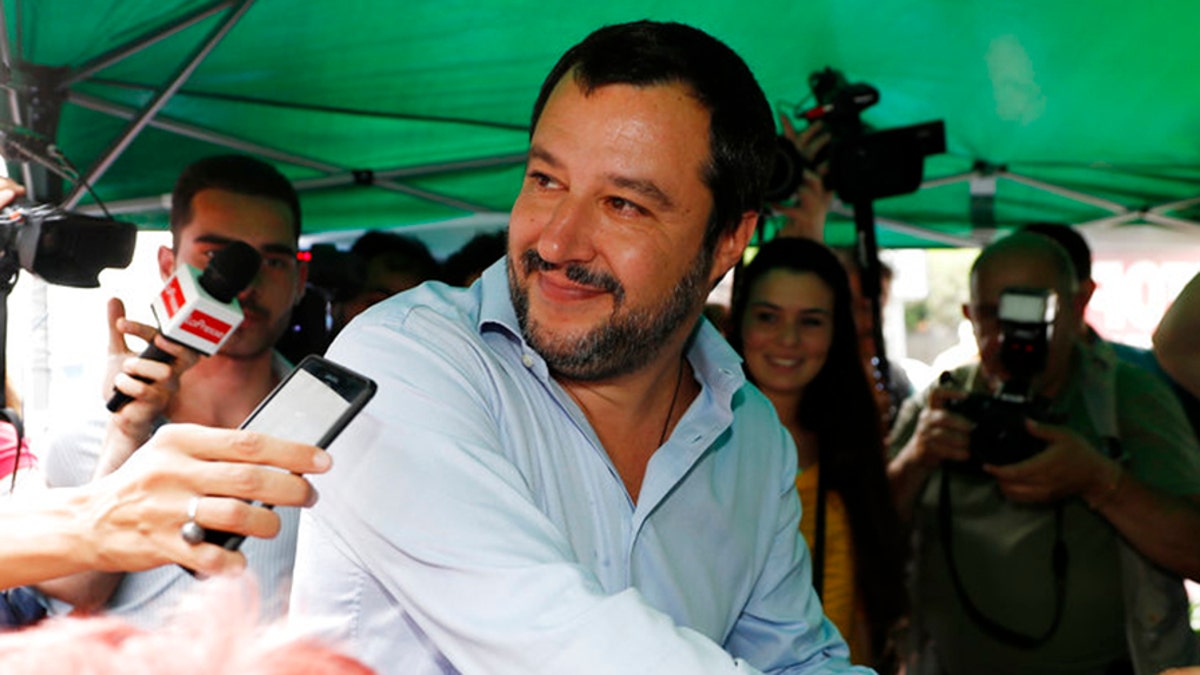
League leader Matteo Salvini has pushed for tougher restrictions on immigration. (The Associated Press)
The Five Star Movement and the League oppose illegal immigration and have pledged to drastically cut the number of such immigrants in the country through deportations and tougher border enforcement.
But the parties also promised to kick-start the sluggish Italian economy with tax cuts and introduce a guaranteed basic income for Italians.
The government is also prepared to fight the European Union and its directives.
Just last month, Salvini, who is sharing the deputy prime minister title with Di Maio, criticized EU officials for rejecting his country’s budget for a second time for violating fiscal rules, the Guardian reported.
He went on to urge the European Commission to “respect the Italian people” and dismissed the EU report criticizing the country’s fiscal policies and threatening with fines.
“A letter from the EU? I’m also waiting for one from Father Christmas,” Salvini declared.
Austria
Populism also took the reins of power in Austria as well, with 32-year-old Sebastian Kurz becoming the country’s chancellor in December, 2017.
Under the leadership of Kurz, Austrian People’s Party, a traditional center-right political force, adopted the populist platform in the wake of the migrant crisis. He formed a coalition government with the Freedom Party, a hard-right nationalist party whose popularity has skyrocketed since the crisis began.
Both Kurz’s conservatives and the Freedom Party campaigned on tougher immigration controls and deportations of asylum seekers whose requests get denied.
In October, Austria joined other populist governments in Europe and the United States and refused to sign the United Nations agreement on immigration.
Earlier this year, the government’s cabinet also approved seizing migrants’ cash – up to $1,040 – and their mobile phones to fund their stay in the country, establish their identity and find out where they have been, Reuters reported.
The plan also instructs the hospital to advise the authorities when asylum seekers get discharged in a bid to make it easier to deport the individual.
The government has also delivered on its promise to crack down on “political Islam” – closing seven mosques and considering expelling imams over foreign financing of religious groups.
Kurz said a hardline Turkish nationalist mosque in Vienna was shut down while a group called the Arab Religious Community that runs six mosques was dissolved.
Hungary
The populist movement in Hungary has made significant strides in recent years, culminating in a total victory in April this year, with Hungarian Prime Minister Viktor Orban and his Fidesz party winning the so-called supermajority – two-thirds of seats in the country’s national legislature.
“We created the opportunity for ourselves to defend Hungary,” Orban told a crowd of supporters after the win. “A great battle is behind us. We have achieved a decisive victory.”
Orban and his right-wing party have long been a headache to the leaders of the EU over his defiance to the migrant crisis.
EU PUNISHES HUNGARY WITH UNPRECEDENTED ACTION
His government repeatedly enacted various measures and legal obstacles in an effort to curb the number of asylum seekers. Since the migrant crisis, Hungary also built a fence on its border with Serbia, where a lot of migrants from the Middle East and Africa traveled, to effectively block illegal entry into the country.
The prime minister recently accused the EU of trying to create a “European Empire” and urged Europeans to oppose the globalism of the union.
“The European Parliament elections in May will decide in which direction Europe's wagon will turn,” Orban said in October during commemorations of a short-lived 1956 anti-Soviet revolution. “We should reject the ideology of globalism and support instead the culture of patriotism.”
"We should reject the ideology of globalism and support instead the culture of patriotism."
But Orban’s leadership has also been met with resistance as the unchecked power prompted his government to introduce unpopular measures that sparked widespread protests.
HUNGARY SEES FOURTH DAY OF PROTESTS OVER NEW OVERTIME RULES, OTHER GOVERNMENT POLICIES
Thousands of protesters marched through Hungary's capital, Budapest, for a fourth day Sunday over new employment laws that gives employers the right to request up to 400 hours of overtime annually, without payment settlement for up to three years.
The critics dubbed the measure as “slavery law,” despite the government’s insistence that it will help to relieve the shortage of labor in the country’s manufacturing sector and letting people to earn more.
France
The French government, unlike in some European countries, isn’t led by populists, but is facing the anger of the people not seen in decades.
French President Emmanuel Macron’s victory about two years ago was touted as a win against the rising tide of populism and an example of a centrist politician defeating the narrow-minded populist Marine Le Pen of the National Front.
Fast forward to today and Macron’s presidency is on the verge of collapse as the “Yellow Vests” take to the streets demanding the end of his presidency.
The “Yellow Vests” movement, which was born after introducing the widely-unpopular gas tax, has spiraled into a larger protest concerning living standards in the country, with many viewing Macron as the “president of the rich.”
'YELLOW VEST' PROTESTERS TAKE TO STREETS OF FRANCE FOR FIFTH WEEK AS MACRON APPEALS FOR 'ORDER'
The anger has sparked violent clashes with police for at least five weekends, with hundreds of arrests every weekend.
Despite Macron’s submission to protesters’ demand to scrap the gas tax, the “Yellow Vests” are continuing their protests. While being a largely leaderless movement, it has issued demands like a referendum on France’s membership in the European Union, curbing illegal immigration and restoring cuts to the welfare state.
Following the protest earlier this month, Macron – who avoided public appearances for weeks – pleaded with protesters to stop and announced a series of concessions.
MACRON PROMISES 'ALL MEANS' TO RESTORE CALM AFTER PARIS RIOTS, PLEDGES TO SPEED UP TAX RELIEF
He promised to raise the minimum wage and abolish taxes on overtime pay starting Jan. 1 -- several months ahead of schedule. He also said a tax hike pensioners faced would be scrapped.
He also asked the country’s employers to give their workers a bonus and said taxes will be reduced. “I would ask all employers who can, pay an end-of-year bonus to their employees,” he said.
Despite the capitulation to the protesters, the “Yellow Vests” continued the protests last weekend.
Germany
Many view Germany as bulletproof to populism, claiming the people generally support Germany Chancellor Angela Merkel and her policies concerning refugees – leading the country to welcome over a million of refugees.
But the backlash to the migrant crisis and the social problems that arose from an unprecedented influx of people, made the three-term chancellor toxic to the voters, leading to fewer votes cast for her party and paving way for anti-immigrant parties to gain traction.
Merkel’s Christian Democrats party had to make tough compromises after the 2017 federal election to remain in power, even going into the government with the Bavarian Christian Social Union.
The chancellor had to embrace more conservative policies towards immigration amid the surge of the far-right and anti-Islam Alternative for Germany, which became the third-largest party in Germany in the recent election.
In a bid to navigate a tough electoral map, with more Germans embracing the anti-immigration party, she had to adopt several policies that went against Merkel’s earlier policies.
During summer she agreed to create border camps for migrants and enforce tighter border control. Under the proposed policies, Germany would create so-called “transit centers” along the border.
All new migrants would have to be screened at the centers and determined if they are eligible to seek asylum in Germany. Any migrant who already applied for asylum in another European country would be rejected and asked to return to the countries where they made the applications.
All this concluded with Merkel eventually announcing that she will step down from politics in 2021. Earlier this month, she made her last speech as the party leader, giving way for Annegret Kramp-Karrenbauer, the likely next German chancellor.
“It is now the time to open a new chapter, it was a great pleasure for me, it was an honor,” she said to the party delegates.
The Associated Press contributed to this report.
